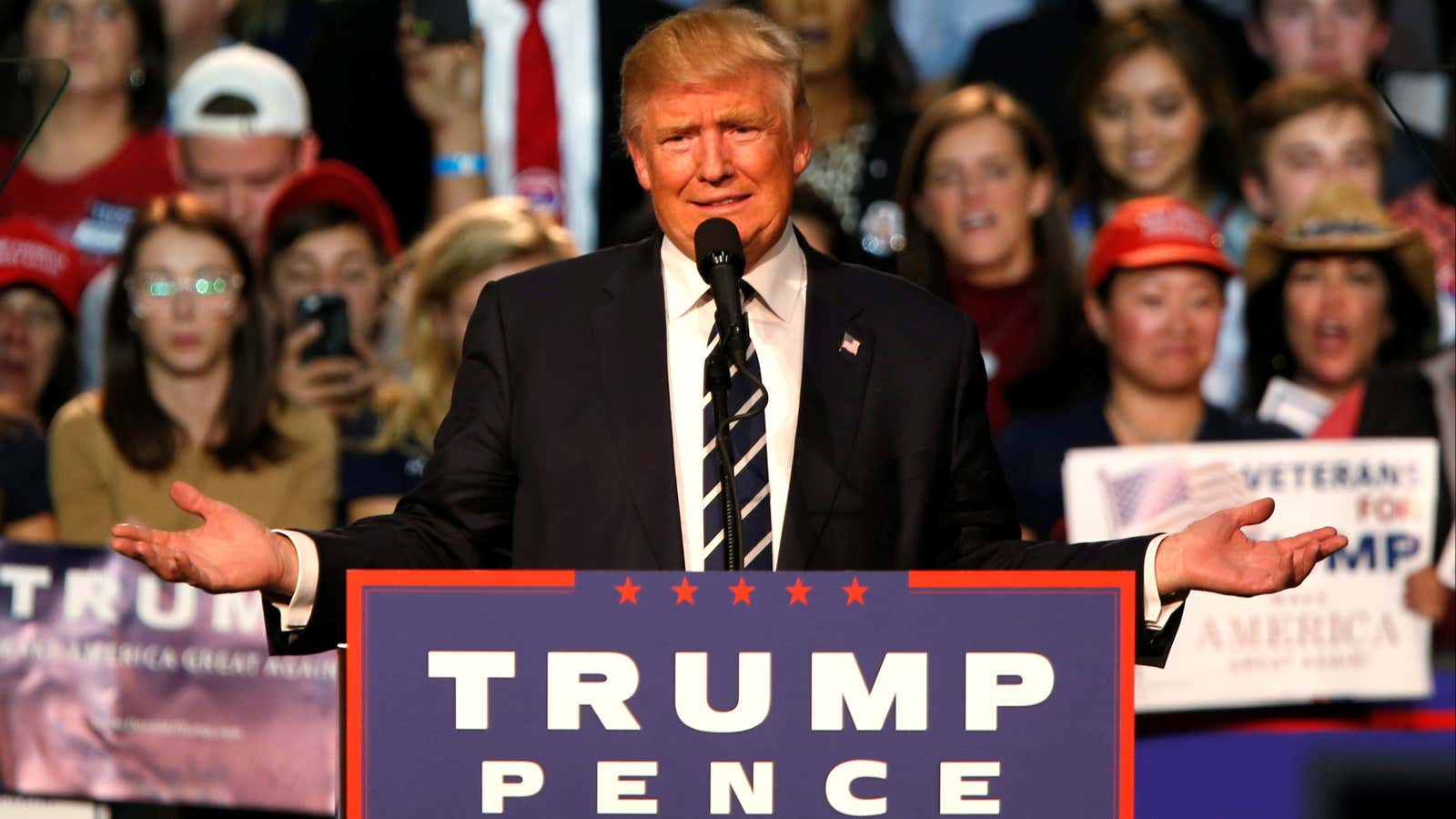In Africa, Donald Trump is believed to have said that Africans are lazy, that African immigrants in the United States should be deported, and that Africa as a continent should be recolonized. With Trump’s presidential win, these comments, allegedly made over the past two years, have begun to circulate again.
Turns out, most of them are fake, having originated on satirical news sites. Trump did not call all Kenyans “conmen” or say that he would “lock up” longtime leaders Robert Mugabe and Yoweri Museveni. So far, the president-elect has not tried to dispute these false stories. Trump’s media office did not respond to a request for comment.
The Trumpisms about Africa began with Politica, a fake news site registered in Kenya, which reported last year that Trump said, “Some Africans are lazy fools only good at eating, lovemaking and stealing.” According to the site, he was speaking at an event in Indianapolis. Blogs and media in Nigeria, Zimbabwe, and elsewhere picked up the story, which then circulated widely on social media. In Kenya, the hashtag #SomeoneTellDonaldTrump started in response to his alleged comments about Africans and Kenyans specifically.
The same purported event was the source of what is the most inflammatory of Trump’s supposed comments about Africa. “In my opinion, most of these African countries ought to be recolonized again for another 100 years because they know nothing about leadership and self governance,” Politica reported Trump as saying. The fact-checking site Snopes found no corroboration of Trump’s comments or any record of his being in Indianapolis that month. Regardless, the claim was circulated on blogs and news sites in Nigeria, South Africa and Ghana.
These stories are readily believed in many African countries in part because they aren’t that far off from comments Trump has made about Muslims, Mexicans, and immigrants in general.
There’s a certain irony in fake news stories about Trump on social media in Africa. Supporters of Hillary Clinton, and some in the media, have blamed Facebook’s Mark Zuckerberg for allowing fake news sources to proliferate on the world’s largest social media platform, propelling Trump to victory.
In January, users on Nairaland, a popular Nigerian forum with over 1.6 million members, circulated quotes of Trump promising to deport Nigerians because “they’re everywhere” and take “jobs meant for honest hard working Americans.” Even though the source of the quote was the satirical news website, Fake Nigerian News, it was shared by Africa Independent Television (AIT), one of Nigeria’s major TV networks. A YouTube video sharing this claim has also been viewed over 100,000 times.
So what has Trump said about Africans and Africa? Trump allegedly described laziness as a “trait in blacks,” according to a 1991 book by a former employee of Trump’s, John O’Donnell. Trump has denied that he ever made the comment.
While Trump has said very little about Africa, he did launch his political campaign by claiming the United States president Barrack Obama was born in Kenya.
Just two days before the elections, Trump went to Minnesota and blamed faulty refugee vetting processes for allowing large numbers of Somalis to come to the state. At a rally in Maine back in August, Trump also singled out the immigrant Somali community in the US, saying they were coming from “dangerous territories,” and fraying social safety nets.
He has criticized US aid programs to the continent, describing a $7 billion aid program to help African countries gain better access to electricity, as a “waste.” He’s also said that he sees “tremendous potential” in Africa.
Trump’s appointment of former Brietbart News president Steve Bannon as White House chief strategist also offers little hope of a nuanced view of the continent. In a September article, the far-right news site described the militant group Boko Haram, which operates in Nigeria and the Lake Chad region in western Africa, as keeping “East Africa under a spell of devastation.”
